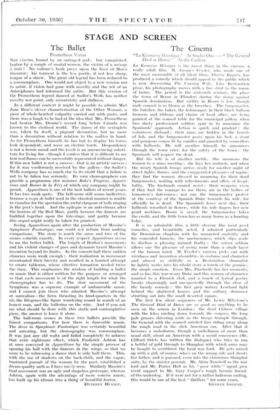The Cinema
La Kermess( Ihrroique is the rarest thing in the cinema, a really adult film. M. Jacques Feyder, who made one of the most memorable of all silent films, Then's( Raquin, has produced a comedy which should appeal to the public which is now discovering The Country Like !test ora t ion prose, his photography moves with a line strut to the music of horns. The period is the sixteenth century, the place the town of Boom in Flanders during the rising against Spanish domination. But virility in Boom is low, though male conceit is as blown as the breeches. The burgomaster,
the butcher, the baker, the fishmonger, in their black balloon trousers and ribbons and chains of local office, are being painted at the council table for the municipal gallery when two dusty professional soldiers spur in to announce the Spaniards' approach. Action is quick and prudent : the volunteers disband : their arms arc hidden in the bowels of fish, and the burgomaster poses upon his bed, a stout and pompous corpse lit by candles and guarded by councillors with halberds. He will sacrifice himself, he announces through the town crier, for the safety of the town : the Spaniards will respect the dead.
But his wife is of another mettle. She summons the women to a mass meeting : she lays her ambush, and when the weary Spanish troops arrive, ready for another night of street fights, flames, and the exaggerated pleasures of rapine, they find the women, dressed in mourning for their dead burgomaster, waiting with refreshments and offers of hospi- tality. The husbands cannot resist : their weapons, even if they had the courage to use them, arc in the bellies of tomorrow's fish-course; nor can time burgomaster protest at the courtesy of the Spanish Duke towards his wife, for officially he is dead. The Spaniards leave next day, their halberds wreathed in flowers, while his wife fingers her new pearl necklace. Boom is saved, the burgomaster Mkt s the credit, and the little town has as many horns as a hunting lodge.
It is an admirable film, a little obscene like most good comedies, and beautifully acted. I admired particularly the Dominican chaplain with his mannered austerity and his concealed humour, the unctuousness which slips aside to disclose a pleasing natural frailty : the screen seldom allows one the pleasure of seeing more than a single layer of the human mind. M. Feyder's camera picks out with vividness and invention absurdities in costume and diameter and almost as skilfully as a Restoration dramatist he lightly works into his ribald story a touch of the genuine, the simple emotion. Even Mrs. l'inchwife has her moments, and so has this war-weary Duke and this woman of character married to a Flemish clod, and a touch of lyrical poetry breaks charmingly and unexpectedly through the close of the bawdy comedy : the first grey watery Lowland light behind the shuttered houses and the solitary &winner strutting out into the small deserted square.
The first few silent sequences of Mr. Lewis Milestone's
The General Died at Dawn are as good as anything to be seen on the screen in London : the dead Chinese village with the kites circling down towards the corpses, the long pale grasses shivering aside as the troops trample through, the General with the scarred satisfied face riding away along the rough road in the slick American car. After that it becomes a melodrama, though a melodrama of more than usual skill, about an American with a social conscience (Mr. Clifford Odets has written the dialogue) who tries to run
a beltful of gold through to Shanghai with which arms may be bought to overthrow the local war lord. Ile gets mixed up with a girl, of course, who's on the wrong side and shoots her father, and is pursued, even into the chromium Shanghai suite, by the sinister general. Mr. Akim Tamiroff as the war lord and Mr. Porter Hall as his " poor white " agent give vivid support to Mr. Gary Cooper's tough laconic friend- of-the-underdog. If it were not for a rather ludicrous ending, this would be one of the best " thrillers " for some years.
GRAHAM GREENE.




















































 Previous page
Previous page